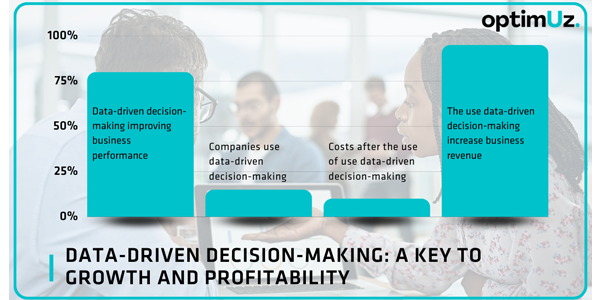The Benefits of Data Acquisition for Businesses

Make Informed Decisions, Identify Inefficiencies, and Optimize Operations
Data acquisition is a crucial process that enables businesses to collect and store data from various sources for analysis and decision-making. This process offers numerous benefits, including the ability to make informed decisions based on accurate and up-to-date information, identify areas of inefficiency, and optimize operations for increased efficiency and cost savings. In this blog article, we will explore the significance of data acquisition for businesses and how it drives growth and success.
Making Informed Decisions
with Accurate Data
Data management provides businesses with the foundation to make informed decisions. By establishing clear guidelines for data collection, storage, and usage, companies ensure access to accurate and up-to-date information.
This enables data-driven decision-making, empowering businesses to analyze market trends, customer behavior, and operational performance. By leveraging reliable data, businesses can confidently make strategic decisions that drive growth and success.

“The more data you have, the better decisions you can make.”
Thomas H. Davenport
Identifying Inefficiencies
Efficiency is a key factor in the success of any business. Data acquisition plays a vital role in identifying areas of inefficiency within operations. By analyzing the collected data, businesses can uncover bottlenecks, streamline processes, and eliminate wasteful practices.
This optimization leads to increased productivity, reduced costs, and improved overall performance. Through data acquisition, businesses gain the ability to pinpoint inefficiencies and take proactive measures to address them, fostering a culture of continuous improvement.
Optimizing Operations:
Data acquisition enables businesses to optimize their operations for enhanced efficiency and cost savings. By setting up data collection tools and ensuring data quality and accuracy, companies can gather the necessary information to evaluate and improve their processes. Industries such as healthcare, finance, and retail heavily rely on data acquisition to inform strategies, tactics, and decision-making.
It helps businesses streamline workflows, improve resource allocation, and deliver better customer experiences. Embracing data acquisition as a fundamental service empowers businesses to optimize their operations and remain competitive in today’s data-driven landscape.
“Data-driven decision-making is the future of business.”
Gartner, a global research and advisory firm
Driving Growth:
Data acquisition is a strategic investment for businesses aiming to drive growth. Companies that prioritize data-driven decision-making and leverage data acquisition tools and technologies gain a competitive advantage. With the increasing availability of data and advancements in data acquisition technologies, more businesses recognize the importance of harnessing data to inform their strategies and drive growth.
By leveraging insights gained through data acquisition, businesses can identify market trends, customer demands, and emerging opportunities, allowing them to adapt quickly, seize advantages, and stay ahead in their respective industries.
A great example of a company that utilized data acquisition to achieve significant benefits:
Netflix is known for its data-driven approach to decision-making, they heavily rely on data acquisition and analysis to inform their content strategy, improve user experience, and drive growth.
Data Acquisition Process:
- User Interaction Data: Netflix collects extensive user interaction data, including viewing history, ratings, and search queries. They track what content users watch, when they watch it, and how they engage with the platform.
- Content Metadata: Netflix acquires metadata from various sources, including production studios and third-party providers. This data includes details about the content, such as genre, cast, director, and release year.
- Demographic and Geographic Data: Netflix analyzes demographic and geographic information to understand the preferences and viewing habits of different user segments in various regions.
- A/B Testing and Experimentation: Netflix conducts A/B testing and experiments to gather more data and insights on user behavior. They test different user interfaces, recommendations algorithms, and content promotions to optimize user engagement.
Understanding the benefits of data acquisition is crucial for businesses looking to optimize their operations, improve efficiency, and drive growth. By collecting and analyzing data from various sources, businesses gain valuable insights that inform their decisions and enable them to remain competitive in today’s digital landscape. Data acquisition empowers companies to make informed decisions, identify areas of inefficiency, and optimize their operations for increased efficiency and cost savings. Embrace data acquisition as a strategic tool, and unlock the power of data to drive growth and success in your business.